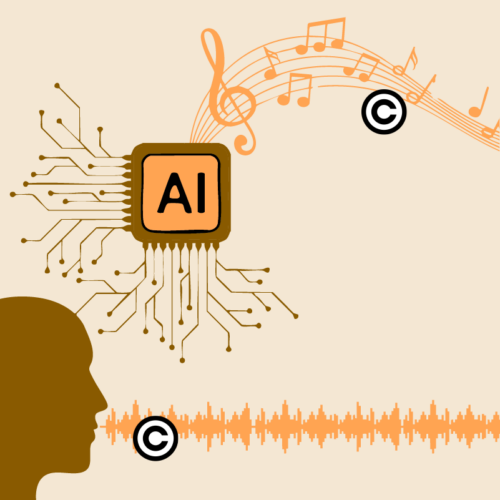
Insights
Artificial Intelligence in the Music Industry
 Introduction
Introduction
World Intellectual Property Day is celebrated on April 26th each year. This year, the event highlights the essential role of creativity in shaping our modern world, with a special focus on the role of artificial intelligence (AI) in the music industry. The spotlight is on this sector as it continues to emerge as a culturally rich and economically vital field. The theme underscores the importance of fair and balanced protection for creators, ensuring that artistic expression continues to thrive while fostering sustainable growth within the industry.
The expanding universe of music industry
Today, music goes far beyond melodies and lyrics—it encompasses a wide range of digital content, including composition and creation, distribution, background scores, and platforms for brand development. In this evolving ecosystem, intellectual property (IP) plays a crucial role in ensuring that creators can secure exclusive rights, monetize their work, and protect their innovations.
IP rights empower artists, songwriters, and producers to control the use of their creations and safeguard the brand identities of musicians and labels. Additionally, trade secrets are essential in defending the technological innovations that support the music industry, such as audio compression algorithms and real-time analysis tools.
Ethical considerations are increasingly relevant, especially with the rise of AI-generated music. Therefore, all aspects of intellectual property should be carefully considered to ensure responsible and fair use of AI in music creation. Recent, Now and Then” The song also made history as the first AI-assisted song. The restorative artificial intelligence (AI) techniques to resurrect a demo recording by the late John Lennon. It has been officially recognized by the Recording Academy.
Adapting for a modern world
The tremendous evolution in how we create, share, and experience music calls for an equally agile legal framework. One of the most significant developments disrupting the industry is AI-generated music. With generative models now capable of producing entire compositions in seconds, the line between tool and creator is becoming increasingly blurred.
Current copyright laws in many countries remain centred on human authorship, leading to confusion when AI is involved. South Korea has become the first country to directly address this issue by establishing a legal framework for works co-created by humans and AI.
The World Intellectual Property Organization (WIPO) is leading global discussions through its Standing Committee on Copyright and Related Rights (SCCR). These efforts include exploring innovative models of authorship, new registration systems, and digital identifiers to manage AI-assisted content in a fair, practical, and equitable way.
Safeguarding the music industry in the time of Artifical Intelligence
Licensing is a critical aspect of the music industry, especially when dealing with samples, remixes, and collaborative projects. Emerging technologies such as blockchain and smart contracts are transforming this space. These technologies offer a wider range of services, including automated, tamper-proof licensing systems and real-time royalty tracking, ensuring accurate and timely payments.
Many of these solutions are being addressed at the international level to tackle imbalances in the digital music economy. It is essential for rights holders to remain informed throughout the licensing process, right up to the end user. Additionally, restrictions on the use of AI should be explicitly included in licensing agreements, with clear penalties for unauthorized AI-generated content.
Today, music branding goes far beyond names, logos, or album covers. Modern artists are making headlines by licensing their voices for AI-generated content, often offering shared royalties and related services. This marks a significant shift toward broader and more inclusive definitions of creative ownership. From voiceprints and virtual avatars to custom sound effects, musicians are increasingly exploring innovative ways to own and monetize their identities in the digital age.
AI music industry in India
In India, many musicians are experimenting with current artificial intelligence technologies, with some even declaring that certain compositions were created without human involvement. However, there is growing concern that AI-generated music should match the emotional intelligence of human creations. Several musicians have emphasized that every musical piece requires emotion, leading to complications such as copyright infringements and ethical concerns.
To address these challenges, protecting artists’ rights through clear licensing agreements is essential. In some instances, the voices of deceased musicians are being regenerated using AI in such cases, prior permission must be obtained from the families of the deceased. While this raises sensitive ethical issues, it also has the potential to reshape the voice of Indian music on a global scale.
The metaverse and music’s next frontier
As live performances expand into immersive 3D worlds, the metaverse presents new challenges for music intellectual property (IP). Key questions arise—such as who owns a virtual concert, and what rights apply when fans remix or co-create content using an artist’s material in a shared environment.
To navigate these uncertainties, musicians are increasingly relying on digital tools to secure their rights and revenue streams in these uncharted territories. These innovations support the development of adaptable IP laws that protect both originality and collaboration. As virtual economies mature, legal frameworks must strike a careful balance between enabling creative exploration and ensuring fair compensation for artists.
Conclusion
The modern music landscape is a dynamic and evolving form. As the industry becomes more decentralized and technologically complex, our understanding and application of intellectual property must evolve as well. By ensuring that legal systems adapt alongside artistic tools, we can help sustain a global ecosystem where creativity thrives and the music never stops.